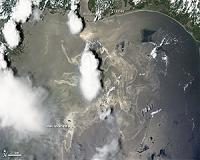| . |  |
. |
New Orleans, Louisiana (AFP) July 13, 2010 BP may be on the verge of capping the well which has been gushing oil into the Gulf of Mexico, but the cleanup is far from over and the damage to the region's environment and economy could last decades. An estimated two to four million barrels of oil have poured into the sea since the BP-leased Deepwater Horizon drilling rig sank spectacularly on April 22, and if the higher end of that range is correct it is the largest accidental discharge in history. Some has been skimmed or burned off the surface. About 40 percent of the oil has likely evaporated and naturally occurring microbes will help to eventually break down a large chunk of the rest. But there is still a vast amount of oil floating at all levels of the water column and spreading out for hundreds of miles in thousands of surface slicks which have sullied hundreds of miles of shoreline from Texas to Florida. "Eventually a lot of that oil will settle to the bottom and in storms it'll just keep washing up on beaches," Paul Montagna, an ecologist with the Harte Research Institute for Gulf of Mexico studies, said in a telephone interview. "That's going to go on for 10 years, maybe 20. That was our experience with the Ixtoc spill off Mexico in 1979." And nobody knows what kind of an impact such huge volumes of oil will have on an ecosystem already stressed by a vast 'dead zone' of oxygen-depleted waters caused by agricultural runoff. Another impact may come from the massive quantities of chemical dispersants used to help keep the oil away from fragile coastal wetlands. "We are extremely concerned about the impact of this oil spill on the Gulf fisheries and fishing families," said Charlie Henry, the National Oceanic and Atmospheric Administration's on-scene scientific support coordinator. "It's difficult to provide what the true impacts might be," Henry told a presidential commission probing the spill. Alaska's herring fishery still hasn't recovered from the 1989 Exxon Valdez spill, and this spill struck at the worst possible time for the Gulf fisheries: spawning season. Young marine life is particularly vulnerable and there are concerns that the fish which do survive will have lower reproductive levels, said Chris D'Elia, dean of Louisiana State University's School of Coast & Environment. Another big fear is that the toxicity levels in the Gulf may finally reach a tipping point where "we go from a productive food chain that involves what we like to eat to a state that involves a bacterial soup," D'Elia told AFP. Recreational and commercial fishing are multibillion dollar industries which support hundreds of thousands of jobs across the Gulf coast. There's no telling how long it will be before the waters are reopened, or when people will feel comfortable eating fish caught in the Gulf. The region's tourism industry has also taken a massive hit, even though the impact on beaches has so far been relatively light. "What's most concerning to all of us and me particularly is losses have occurred in our area without a single drop of oil reaching our beach," said Keith Overton, chairman of the Florida Restaurant and Lodging Association. Meanwhile, the oil industry and local officials have warned that the suspension of offshore drilling while new safety regulations are drafted could cost the region tens of thousands more jobs. After several failed attempts with other devices, BP on Tuesday was praying that its latest device -- a 75-tonne cap dubbed the "Top Hat 10" -- could safely seal the ruptured well nearly a mile below the surface. Many expressed fears that once the oil stops flowing, attention will quickly shift away from the disaster zone and the opportunity for systemic reform will be lost. "We hope BP has finally been able to cap this well, but it won't make the problem go away. The damage to the Gulf will last for years," said Greenpeace energy campaigner Gary Cook. "The only path for the Gulf to recover is to ban deepwater drilling, speed up the end of the oil age and invest in a clean energy future."
Share This Article With Planet Earth
Related Links Our Polluted World and Cleaning It Up
 BP well may be capped, but oil's damage is far from over
BP well may be capped, but oil's damage is far from overNew Orleans, Louisiana (AFP) July 13, 2010 BP may finally have capped the well which has been gushing oil into the Gulf of Mexico, but the cleanup is far from over and the damage to the region's environment and economy could last decades. An estimated two to four million barrels of oil have poured into the sea since the BP-leased Deepwater Horizon drilling rig sank spectacularly on April 22, and if the higher end of that range is cor ... read more |
|
| The content herein, unless otherwise known to be public domain, are Copyright 1995-2010 - SpaceDaily. AFP and UPI Wire Stories are copyright Agence France-Presse and United Press International. ESA Portal Reports are copyright European Space Agency. All NASA sourced material is public domain. Additional copyrights may apply in whole or part to other bona fide parties. Advertising does not imply endorsement,agreement or approval of any opinions, statements or information provided by SpaceDaily on any Web page published or hosted by SpaceDaily. Privacy Statement |